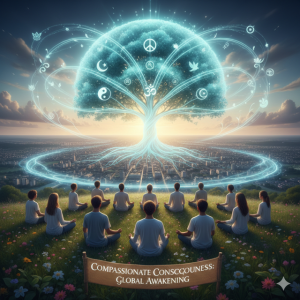
Mindfulness is a form of meditative practice which focuses upon our mind and attention. In Mindfulness we notice bodily experiences, such as our breathing, sensation, and our energy. We notice external things such as sounds near to us, smells, taste and touch. Mindfulness draws upon a knowledge base of cognitive behavioural psychology, neuroscience, and Buddhist philosophy and psychology
Mindfulness draws our attention to the fluctuating nature of the mind with its many thoughts, ideas and images that flit across our awareness. In mindfulness we notice thoughts, perceptions, feelings, reactions and emotions but we do not identify with them as the self, but recognise them just for what they are; hectic intrapsychic activity. The hopeful fruits of mindfulness for our lives through our focus on the here and now, in the present moment, is to help us to be more aware generally in our lives of the beautiful things we might miss in the morass of our many thoughts, e.g., the beauty of a sunset or sunrise; the scents of nature, or the delicious taste of something we are eating or drinking. The busyness of our mind and its many thoughts and distractions can draw us away from joy and peacefulness, right here and right now.
Busy and habitual thinking can make us lose contact with our bodily sensations. which are an important anchoring in life in the present moment. Through noticing our senses such as vision, hearing, olfactory senses, taste and touch, we can enjoy our senses more profoundly.
There are nine attitudes of mindfulness based upon Jon Kabat Zinn’s original 7 attitudes of mindfulness: beginners mind; non-judgement; trust; letting go; non-striving; acceptance; patience; gratitude and generosity.
Beginner’s mind – witnessing the present moment with the mind and eyes of a beginner. In terms of mindfulness this might be recognizing the flow of thoughts that pass through our mind, the judgements that arise within us or our conditioned reactions, in relation to particular phenomena. Through noticing these mental and somatic reactions, we can choose not to give them central stage in formulating our perspective on our experience. The beginners mind might potentially make room for something new that might arise from our creativity; allowing ourselves to be surprised by this innate creativity. For example, if I bring a beginner’s mind to my role in my job, I might see ways of developing the role emerging with a fresh and creative perspective rather than using a mind conditioned by past, experiences and narratives which might limit my vision. This happened recently in some interfaith work I undertook as a chaplain in the hospice where I work. I outreached to the local Islamic community the week during the UK riots (August 2024) and came to this meeting and encounter with empty hands and an open heart, to listen, to try to understand and to allow this listening to enrich the conversation.
Non-judgement – in terms of mindfulness this is attempting to cultivate a mind that can look at a phenomenon or phenomena without being overly influenced by our mental or social conditioning. A mind which is non possessive, not driven by one interpretation or set of beliefs, nor driven by a desired outcome, and is willing to tolerate uncertainty, and be open to multiple possibilities, can approach life in creative ways and from a more compassionate position.
Trust – In terms of mindfulness let’s remember, that when we sit in a chair, we don’t anticipate that the chair will collapse under us; when we walk on the pavement we trust that the ground under our feet will not suddenly give way and cause us to fall into a chasm. We trust that our heart will beat and our lungs will breathe. The quality of trust in terms of mindfulness practice is about cultivating a mindful sense of our ability to trust ourselves and life in a way that is similar to how we trust the chair or the ground. This trust is not done naively (e.g., if we noticed the chair had large cracks in the legs we wouldn’t sit down on it). It is not undertaken by refusing to listen to our natural fight, flight or freeze evolutionary capacities for detecting risk or danger and responding to it (e.g., not walking in proximity to an angry and vicious dog). Trust, however is attempted by witnessing, but not identifying with our conditioned memories, thoughts, feelings and responses from the past to our experience of witnessing. For example, if you have been let down in previous romantic relationships, this does not mean you can’t ever trust romantic relationships, but through mindfulness you can learn to trust the wisdom within you to help you to discern what can help you with trusting people with wisdom rather than falling prey to strategies of control. Trust is about becoming more in-tune with our creativity and intuition, which could be described as our hearts ability to wisely guide our mind through discernment.
Letting-go – Mindfulness can help us to detach from ego driven over management of aspects of our lives (e.g., relationships, work, health, etc.,) in which we might have come to believe requires our absolute and dedicated control. This desire to control can often arise from previous adverse experiences in our lives such as a betrayal, abuse, a career loss, a divorce, a bereavement, and many other life events. The desire to control is understandable and definitely calls for mindful compassion; but controlling strategies are not something we want to determine our decisions or behaviour, now.
Non-striving: In terms of mindfulness, non-striving describes how we can become aware of our capacity to do life in terms of achieving, acquiring, attaining, succeeding, etc., Non striving invites us into the ground of being rather than doing (striving). Mindful non striving can create space for making room for deeper wisdom to arise by our slowing down and stopping. This can enhance our doing because it can potentially release our creativity, wisdom and deeper knowledge. I have heard it said that geniuses very often had their eureka moments, not in the laboratory but whilst in the shower or enjoying a cup of tea.
Acceptance – with respect to the mindfulness of acceptance this refers to a shift in perception from being overwhelmed by our resistance to what is happening in our lives, and gently allowing ourselves to accept that an issue for what it is, right now. Acceptance is not passive relinquishment of responsibility or action. If I needed to prepare myself for demanding and difficult experiences, a position of acceptance could help me to allow my mind to calm, and for my resilience, stamina and coping skills to come online.
Patience – in terms of mindfulness, acceptance and non-striving are strongly linked to patience. Cultivating mindful patience can consist of accepting the reality of something in a given moment (e.g., a health, social or financial problem) and putting a pause on doing something immediately, and just allowing the issue to be for a while. Sometimes, (not always) remaining calm when events may seem to be in flux, and delaying wanting to react or act (i.e., immediately engaging with problem solving) can help me to be less stressed and overwhelmed (which might undermine my effectiveness needed with managing a phenomenon) possibly allowing more helpful perspectives to arise from wisdom.
Gratitude – in terms of mindfulness, whatever problems we face in life, if the mind with which we are going to face these problems is dominated with thoughts of complaining and dissatisfaction, this will impact on our experience of these problems. These negative responses can ruin our potential for peacefulness and happiness. Gratitude in comparison is a mind-set that looks upon our lives in terms of what is good, helpful and fulfilling in our lives, which cultivates peace and balance. The mind when honed upon what is wrong, tends to exclude from our mind what is good and beautiful. There is psychological and neuroscientific research into the benefits of cultivating gratitude for our lives which suggests many therapeutic benefits from cultivating gratitude such as peace of mind, greater stress reduction, increasing self-esteem, increased personal happiness, positive mind states and medical benefits such as lower blood pressure, better sleep, stronger immune system, etc. The research suggests positive neuroplasticity in terms of our brain wiring for happiness.
Generosity – in terms of mindfulness, generosity and compassion belong together in the same domain. Cultivating a generous, giving heart towards others, can make us experience ourselves in a positive and meaningful way. The golden rule from most religions and philosophies of life, is do unto to others as you would want to be done to you. What we do to others affect how we perceive ourselves. Our actions of generosity help define our attitudes towards ourselves and others. Grasping and over-attachment to impermanent things that will disintegrate are strongly linked to craving. Grasping can only be satisfied by the constancy of getting things and holding on to them. Generosity in contrast, is a quality of being that is lasting and takes joy in the happiness and fulfilment of others.
Embodiment of mindfulness is the goal of practice.
Embodiment is the result of embedding mindfulness practice into the very fabric of our lived existence and experience. Repetition of mindfulness practice is key. It must permeate every aspect of our lives, with our becoming a more mindful person. It is not the supplanting the person I am with a different identity. It is our leaning close to our deepest true self underpinned with the qualities of patience, compassion, cooperation and acceptance. Being mindful with humility, is what enables us to become authentic mindful practitioners, because we are in contact with who we truly are at the deepest level of our being. Professor Paul Gilbert identifies these deep qualities of being as emerging from our evolutionary development for survival which has helped humanity to survive as a species, especially through cultivating capacities for caring, attachment, cooperation, and extending warmth and protection to the vulnerable, especially children. This deep reservoir of our consciousness is capable of compassion, service, creativity, innovation and many other positive qualities of being. Not perfect, but imperfectly perfect.
The psychological wisdom drawn upon from ancient Buddhism to inform mindfulness practice are multi-form: (1) recognising the nature of suffering and the causes of suffering; (2) recognising there is a way to end suffering and the path that leads to the end of suffering; (3) the importance of mindful detachment; acceptance of the reality of the present moment; observing the nature of the mind and emotions and understanding how the mind can be complex and tricky, etc. (4) practices such as loving kindness meditation and the cultivation of warm heartedness. All of these inform the nine attitudes of mindfulness: non-judging, patience, the beginner’s mind, trust, non-striving, acceptance, gratitude, generosity, and letting go.





